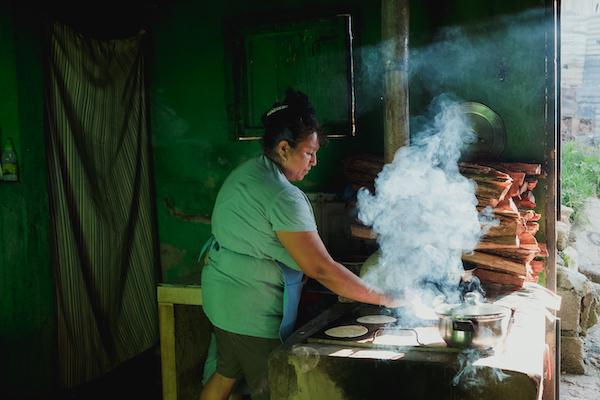Food is so much more than just its physical elements. It tells a story about our cultural traditions, familial love, and hope for the future.
Even if you asked just two people to tell you their stories about food, their answers wouldn’t be exactly alike. As a Canadian of Dutch descent, for example, I might tell you about two potato-based comfort food dishes: poutine, a Canadian classic made with gravy, cheese, and french fries, and the popular Dutch meal called boerenkool stamppot, a hearty combination of kale and potatoes. Perhaps I would describe delicious meals skillfully prepared by my grandmother—my “Oma.”
This conversation might eventually lead me to recall a memorable food item that my Oma often talked about eating while she lived in The Netherlands during World War II: tulip bulbs. With their dry, bitter taste these were far from appetizing, but they served as a source of much needed sustenance in a time of severe food scarcity.
Lack of food also tells a story—one about injustice, hopelessness, communities and children being robbed of health and opportunity. Food security is the foundation from which communities and families are able to grow, thrive, and create new opportunities.
In a world still shaped by the injustice of hunger, World Renew is training farmers in sustainable agriculture and teaching families about healthy diets and nutrition. Together, World Renew partners with families around the world, so they can access enough healthy food.
Merlyn Zulema Zambrano is a farmer and businesswoman in rural Honduras who can tell many stories about living without enough food. When she was just nine years old, she began working as a babysitter to help support her family.
Now Merlyn is the single mother and sole provider for her two teenagers, Estefany and Erlin. She wants different stories for her beloved children.
“Because of the difficulties I experienced as a child, I made a promise to myself to provide my children with the things they need—food, clothing, healthcare, education—and the opportunity to enjoy their childhood without having to work,” she says.
With support from World Renew, Merlyn was trained in small business management helping her start her own venture—a tortilla business. She had initial success selling her tortillas, but the skyrocketing prices and lockdowns that came with the COVID-19 pandemic slowed her sales. Her business is still recuperating.
But Merlyn has not given up.
Today, this determined mother is committed to ensuring that her children’s childhood is not consumed by work. With the support of World Renew, she is building back up her tortilla business as markets slowly recover—and continuing to work at the local community garden.
“Business isn’t completely good, but I am always grateful to God because my family has their basic needs covered,” she says. “I am so grateful to World Renew for the learning and tools necessary to work in areas of agriculture and community transformation. This has allowed the development of a shared vision as a team of women farmers.”
Merlyn’s stories of food are not hers alone; the way one person chooses to use and share food affects others.
As one way to share a table with, and support, people like Merlyn, World Renew is inviting individuals and families to host a “Dinner for Good.” This Dinner for Good campaign invites participants to join with family members, neighbors, and others for a special evening without the added expense of a night out.
Two Dinner for Good kits are available to set the stage for cooking and meaningfully engaging with the themes of food, faith, and justice. One kit created in partnership with Food Network Chef Melissa d’Arabian features a recipe for chicken piccata with a side of polenta. There is also an internationally inspired kit from World Renew’s Zambia staff featuring a savory stew of spinach and sweet potatoes.
After this tasty time of food and fellowship, World Renew hopes that those who participate will donate what would have been spent on an evening out together—or a gift amount that feels right—to join efforts in ending hunger around the world.
To some, this may seem like a seemingly small action, but even this opportunity is a big step in helping more of God’s children to thrive—to journey out of poverty and into plenty.
If, years from now, Merlyn’s children are asked to talk about food, they might still recall moments when food was scarce. But hopefully for them the sting of hunger will be a distant memory.
Perhaps they instead will want to talk much more about their hardworking mother—her deep and life-changing love and the warmth of her thick, delicious tortillas. Perhaps they will also recall the efforts of others who journeyed with them by helping to end hunger for good.
What beautiful, grace-filled stories food can tell.


